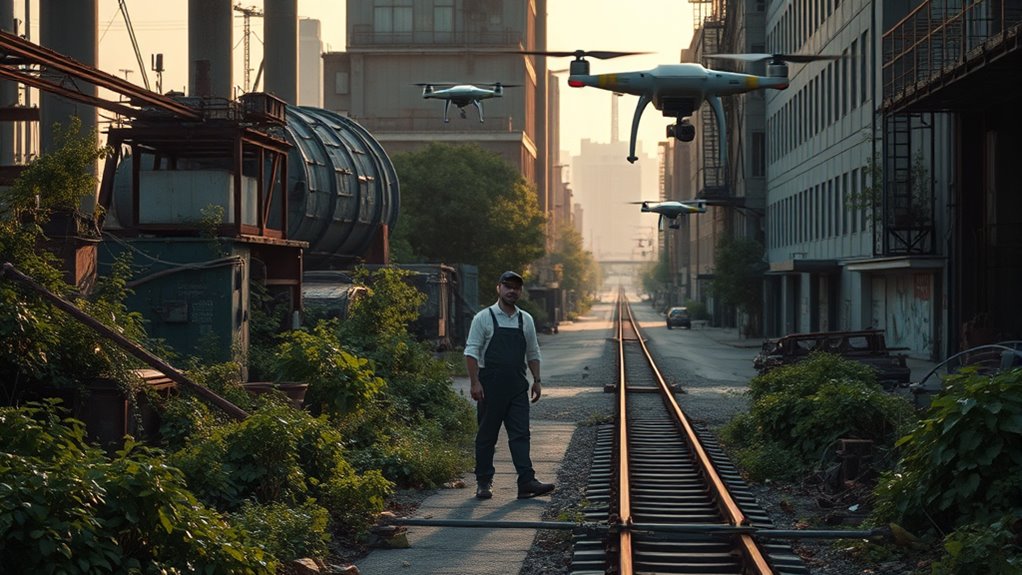As automation and AI advance rapidly, many routine jobs are disappearing, making human labor more of a luxury than a necessity. Businesses boost productivity and cut costs by replacing roles with machines, pushing the idea that work could become optional for some. While this shift offers more leisure and creativity, it raises questions about societal stability and inequality. To explore how this future might unfold and what it means for you, keep exploring the possibilities.
Key Takeaways
- Automation and AI are displacing many roles, potentially reducing the need for human labor in routine tasks.
- Increased productivity from automation may lead to a society where human work is minimal or optional.
- Economic shifts could make human labor a luxury, accessible mainly to those in high-skill, creative, or strategic roles.
- Societal challenges include resource distribution, inequality, and the societal impact of a workless or “work-optional” society.
- Advances in AI and robotics could enable a future where human labor is no longer essential for economic or social functioning.
The Rise of Automation and Its Impact on Employment

As automation and AI continue to advance, they are dramatically transforming the job market. About 14% of workers have lost their jobs due to AI or automation, with AI ranking as the seventh-largest cause of displacement in the U.S. in May 2023. These technologies are driving rapid changes across industries, especially in tech, where many roles have been reduced. Automation boosts productivity and helps companies cut costs, but it also raises concerns about job security. AI-driven tools like chatbots are replacing customer service reps, and some jobs, such as transcription and customer support, are expected to decline. Despite job losses, automation also creates new opportunities in AI development and maintenance, reshaping the employment landscape in profound ways. The projected economic impact of AI is estimated at $15.7 trillion by 2030, highlighting both the vast potential and challenges of these technological advancements.
Shifting Workforce Dynamics in a Digitized World

Digital transformation is reshaping how work gets done, with more employees seeking flexible arrangements that accommodate remote and hybrid models. You notice employers redesigning roles to fit digital environments, focusing on outcomes rather than hours. Workforce flexibility, driven by advanced collaboration tools, fuels digital nomadism and distributed teams. To stay competitive, companies invest in digital infrastructure supporting these shifts.
| Focus Area | Key Changes |
|---|---|
| Skill Development | 85% plan to upskill; 70% hire for new skills |
| Workforce Composition | 40% consider staff reductions; 50% transition roles |
| Talent Attraction & Retention | Prioritize well-being; personalize engagement |
| Diversity & Inclusion | 83% report DEI programs; broader talent pools |
Economic Implications of Automation-Driven Productivity Gains

Automation drives significant boosts in economic output and cost efficiency, reshaping how businesses operate. As productivity rises, the value of human labor shifts, with some roles becoming less central and others more strategic. These changes challenge you to think about how economies will adapt and what new opportunities or disparities may emerge. Overall economic potential of generative AI estimates suggest that the impact could be comparable to entire national economies, prompting a reconsideration of labor’s role in future prosperity.
Boost in Economic Output
The surge in productivity driven by automation has particularly boosted economic output, even as employment declines in certain sectors. Manufacturing output in the U.S. increased by 71.8% from 1990 to 2016, despite a 30.7% drop in jobs, highlighting automation’s role in growth. By 2025, about 25% of manufacturing tasks are expected to be automated, up from 10% in 2015, further fueling productivity. Automation and advanced technologies like generative AI could add between 0.5 and 3.4 percentage points annually to global productivity growth, helping offset employment declines. Sectoral gains in healthcare and construction are also promising. These improvements drive economic expansion, making output more efficient. Automation adoption rates across various business functions are increasing rapidly, raising questions about how these gains are distributed across society. Additionally, the role of technological innovation continues to accelerate, further amplifying productivity benefits across multiple industries. Furthermore, the impact of Gold IRA investments on diversifying portfolios and safeguarding wealth becomes more relevant in an era of economic transformation. The increasing integration of advanced manufacturing technologies underscores the potential for work to become increasingly optional for many workers in the future.
Cost Efficiency Gains
As productivity continues to rise thanks to automation, companies are increasingly recognizing the significant cost savings it offers. Automation optimizes repetitive tasks, with 94% of firms already performing activities that can be automated, leading to lower operational expenses. Workflow automation streamlines processes, enabling businesses to cut costs while boosting efficiency. The return on investment is substantial, as automation enhances service quality and reduces manual labor. Successful implementations often involve leaders who understand the full scope of automation costs, ensuring smarter deployment. Automation technology also facilitates “lights-out” operations, further reducing expenses. Moreover, the shift towards cultural heritage and upbringing influences how companies approach workforce automation and integration. Overall, these cost efficiency gains allow companies to operate more leanly, freeing resources for innovation or expansion, and reinforcing automation’s role as a key driver of economic advantage. Market growth and increased investment in automation technology continue to accelerate these benefits, making automation an increasingly vital component of competitive strategy.
Shifts in Workforce Value
Automation’s rise is transforming workforce value by displacing millions of jobs and reshaping employment patterns worldwide. By 2025, around 85 million jobs across at least 15 industries could be disrupted, with machines and humans sharing work efforts roughly equally. Historically, each new robot reduced U.S. employment-to-population ratios and led to job losses—up to 3.3 jobs per manufacturing robot. While automation boosts productivity—saving up to 360 hours annually per worker—it also exerts downward pressure on wages, with a 0.4% decline observed between 1990 and 2007. Automation’s overall impact on productivity and efficiency Rapid reemployment is essential; delays cause unemployment spikes and wage stagnation. Although automation can create new jobs, many workers face significant reskilling challenges, highlighting the shifting importance of human labor and the need for workforce adaptation.
Transforming Job Roles: From Routine to Creative Tasks

Transforming job roles from routine tasks to creative endeavors reflects a fundamental shift in the modern workforce. You’ll notice a surge in demand for creative skills, with over 70% of companies expecting creativity to become even more critical by 2027. The creator economy has grown rapidly, adding 165 million new creators worldwide in just two years, mostly working remotely. Creativity is seen as essential for economic growth, with 80% believing opening it fuels progress. Technology, especially AI, enhances creative thinking for more than half of marketing managers. Meanwhile, many traditional roles like clerical work and data entry decline due to automation. To thrive, you’ll need to develop creative problem-solving, adapt to new tools, and embrace resilience in an evolving job landscape. Technological advances are expected to further boost this trend by providing new platforms and tools for creative expression and innovation. Additionally, fostering home improvement skills such as organizing and decluttering can create inspiring environments that stimulate creativity and productivity, emphasizing the importance of adaptable spaces in the modern work environment. Incorporating personal development practices like mindfulness and self-reflection can support ongoing growth and adaptability in your career. Embracing training in quality assurance can help workers ensure the reliability of new tools and systems, supporting ongoing innovation. For instance, retail store hours can influence your shopping routines and overall productivity. Incorporating elements like organized living spaces can help maintain focus and foster a more creative mindset in your daily routine.
The Future of Work: When Routine Becomes Obsolete

The shift toward creativity in the workplace is reshaping job roles, but automation is rapidly making routine tasks obsolete. You’ll notice increased efficiency and fewer errors, boosting productivity and decision-making. Companies save costs—robotic automation costs a fraction of human labor, making it an attractive choice. By 2030, nearly half of energy, utilities, and mining jobs face automation risks. AI integration into familiar tools has driven a surge in automation, with some sectors like office work and customer service already vulnerable. Managerial tasks could be fully automated soon, and millions of jobs in manufacturing and retail are at risk. While automation reduces repetitive work, it also poses economic shifts and job uncertainties. The future of work hinges on how adaptable you are to these technological changes. Additionally, advancements in Vetted – Nightingale Studio have contributed to the development of more sophisticated automation solutions, further accelerating this trend. As workforce adaptability becomes increasingly vital, ongoing education and skill development will be essential for workers to remain relevant in this evolving landscape. Furthermore, understanding financial implications of automation, such as impacts on income and employment stability, will be crucial for policymakers and individuals alike. Developing retirement planning strategies, including products like annuities, can help provide financial security amid these changes. The integration of educational toys and other learning tools can play a role in preparing the next generation for this changing environment.
Skills of Tomorrow: Preparing for an Automated Workforce

To stay ahead in an automated workforce, you need to embrace new skill sets like digital fluency and creative expertise. Managing automation effectively requires understanding how technologies integrate into workflows and how to adapt quickly. Developing these capabilities prepares you to thrive amid rapid technological change and new opportunities. Additionally, fostering active listening and empathy can improve collaboration and innovation within automated environments. Recognizing the importance of AI security measures ensures that these technologies are deployed safely and ethically, safeguarding both organizations and users. Furthermore, understanding performance metrics related to automation tools can optimize their effectiveness and efficiency in various tasks. Incorporating knowledge of eye patch benefits and their proper use can also be part of health-conscious work environments, promoting well-being during demanding schedules.
Embracing New Skill Sets
As automation reshapes the workplace, developing new skill sets becomes essential for staying relevant and competitive. You need to focus on skills that complement AI and automation, like data literacy, critical thinking, and adaptability. These skills help you interpret data effectively, solve complex problems creatively, and stay resilient amid rapid change. To succeed, consider:
- Building data literacy through visualization and analytics training
- Enhancing critical thinking to generate innovative solutions
- Embracing continuous learning via job rotations and workshops
Navigating Automation Management
Managing the rapid growth of automation requires developing new management skills that can effectively oversee and optimize these technologies. You need to understand how automation impacts workflows, productivity, and employee roles. Nearly 74% of employees report automation helps them work faster, so managing these tools wisely boosts efficiency. With 69% of managerial tasks potentially automatable by 2024, you must learn to balance automation with human oversight. Stay informed about trends like AI integration, which only 20% of leaders expect to use extensively within a year, and prepare your team for digital transformation. Skills-based hiring and automation tools are becoming essential. Your challenge is to implement automation strategically, ensuring it enhances productivity without risking job displacement, especially in high-risk sectors like energy.
Cultivating Creative Expertise
Have you noticed how the skills valued in the workforce are shifting rapidly due to automation and AI? To stay relevant, cultivating creative expertise becomes vital. You’ll need to develop skills like:
- Creative thinking and problem-solving, especially in sectors like insurance and finance, which lead in innovation.
- Resilience and adaptability to handle climate change and economic shifts.
- Lifelong learning to keep pace with evolving tech, such as AI, big data, and networks.
These skills aren’t just supplementary—they’re indispensable. Employers increasingly prioritize durable skills like critical thinking, collaboration, and leadership. By fostering creativity and curiosity, you prepare yourself for a future where human ingenuity remains irreplaceable, even as automation takes over routine tasks. Staying proactive in developing these skills ensures your relevance in an automated world.
Societal and Ethical Considerations of a Workless Future

A future where human labor becomes optional prompts profound societal and ethical questions. You must consider how resources and opportunities are distributed, guaranteeing fairness across all demographics. The shift could redefine work’s purpose, emphasizing personal growth and fulfillment rather than economic necessity. Social structures may change, with increased leisure time impacting community bonds and daily interactions. As automation and AI displace jobs, the importance of robust support systems, like universal basic income, grows to maintain stability. Ethically, questions about equity, access, and the value assigned to work emerge—how society values human contribution beyond productivity. Globally, adapting policies will be vital to guarantee that a workless future benefits everyone, preventing inequality and fostering a more inclusive, humane society.
Frequently Asked Questions
How Will Automation Affect Income Inequality Globally?
Automation will likely widen income inequality worldwide by replacing low- and middle-skilled jobs, making it harder for less-educated workers to earn a living. You might see wealth concentrate among those who own capital and technology, while many struggle with job displacement. Without proper policies, this trend could deepen global disparities, but investments in education and retraining can help you adapt and benefit from technological progress.
What Measures Can Prevent Mass Unemployment From Automation?
Think of automation as a storm threatening to sweep away jobs, but you can steer the ship. To prevent mass unemployment, you should promote technological complementarity, redeploy workers, and adjust working hours. Invest in education and training, support entrepreneurship, and diversify industries. Strengthening social safety nets and implementing data-driven policies will help you build resilience. With strategic action, you can turn this challenge into a wave of new opportunities, not a tsunami of job loss.
Will AI Replace All Human Jobs in the Future?
You wonder if AI will replace all human jobs in the future. While AI can automate many tasks, roles requiring creativity, empathy, and complex decision-making are less likely to be fully replaced. You’ll still find value in jobs that need human interaction and judgment. Instead of total replacement, AI will transform work, creating new opportunities and requiring you to adapt, learn new skills, and find new ways to contribute.
How Can Workers Reskill for an Automated Economy?
Reskilling for an automated economy requires you to embrace education and explore evolving expertise. Focus on fostering flexibility by developing skills in AI literacy, data analytics, and cybersecurity. Take advantage of targeted training programs, leverage AI-driven learning tools, and pursue practical experience. By staying curious, continuously learning, and adapting quickly, you’ll position yourself to thrive as technology transforms industries and opens new opportunities.
What Ethical Concerns Arise With Automation and AI?
You should consider the ethical concerns that come with automation and AI. These include job displacement, which can cause financial hardship and inequality, and bias in AI systems that may lead to discrimination. Privacy issues also arise, as AI handles sensitive data and enables surveillance. Additionally, autonomous decision-making raises questions about accountability and transparency. Addressing these concerns requires responsible development, regulation, and ongoing oversight to make sure AI benefits society ethically.
Conclusion
As automation reshapes your world, work might become as rare as a unicorn—something you only see in stories. Embrace the change, because you hold the power to adapt and thrive in this new era. Your skills and creativity could become your greatest treasures, making work optional yet meaningful. The future isn’t set in stone; it’s waiting for you to decide whether you’ll ride the wave or be swept away by it.









